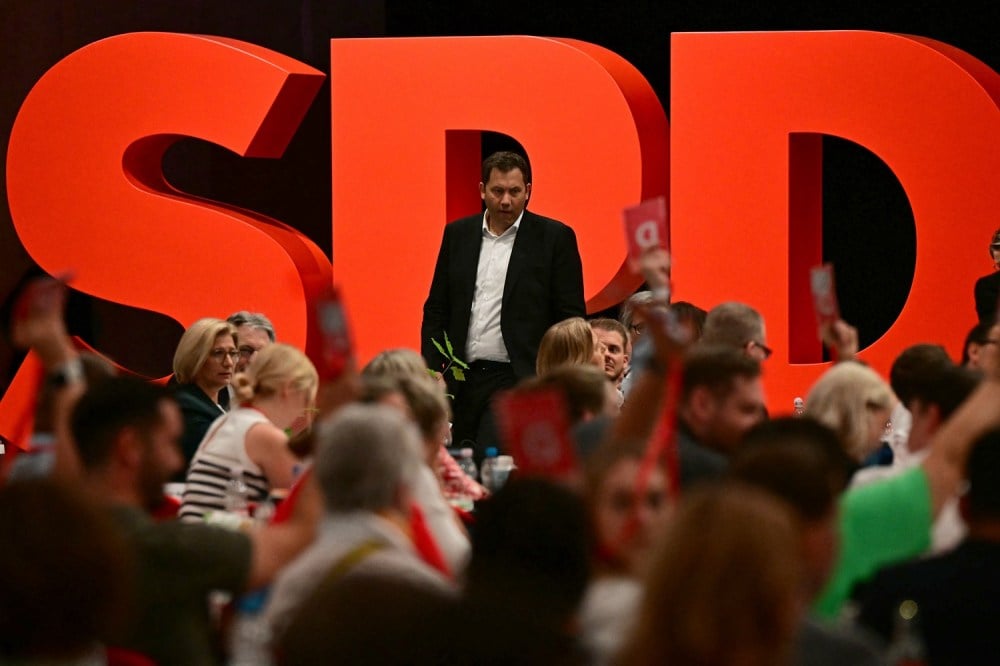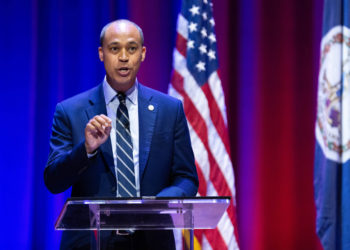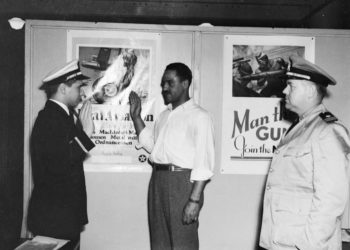The incumbent Social Democratic Party (SPD) suffered a disastrous result in Germany’s February election. Chancellor Olaf Scholz was forced to step aside, and the SPD entered into a governing coalition with the victorious conservative Christian Democratic Union (CDU). As Germany redefines its foreign and defense posture in the face of mounting geopolitical threats, though, the cohesion of that coalition has been thrown into doubt.
The SPD is sliding back into outdated pro-Russia reflexes, confirmed by a recent bombshell development: In late June, senior lawmaker Ralf Stegner was removed from the parliamentary intelligence oversight panel following earlier reports that he had participated in a clandestine meeting with Kremlin-adjacent individuals in Baku.
Stegner’s sidelining came amid internal reshuffling that reflects the party’s fracture over how to respond to Russian aggression. Eastern-leaning longtime Bundestag SPD leader Rolf Mützenich was ousted from that job in February by a more Europe-focused Lars Klingbeil. But then, last month—timed just weeks before the late June NATO summit and immediately ahead of the SPD’s party congress—more than 100 SPD officials and veteran members issued a manifesto urging a return to diplomacy with Moscow. While only five current Bundestag members signed the document, the symbolism far outweighs the numbers. Among the signatories were Mützenich and Stegner, as well as former party chair Norbert Walter-Borjans and former Finance Minister Hans Eichel. Each signatory is representative of the SPD’s pacifist current.
Defense Minister Boris Pistorius, himself an SPD member, described the manifesto as “a denial of reality.” He warned: “We can only negotiate with this [Russian President Vladimir] Putin from a position of strength.” Klingbeil reinforced the point: “Military strength and diplomacy are not opposites, but two sides of the same coin.” Chancellor Friedrich Merz, seeking to avoid the appearance of early coalition fracture, noted that “the government is fully united in its assessment of Russia’s aggression and what it requires of us.”
But beneath that unity lies a persistent schism. What once was a foreign-policy debate is now a governing dilemma, as the persistence of pro-engagement voices within the SPD not only threatens internal party coherence but also risks paralyzing Germany’s ability to act decisively in a rapidly deteriorating European security environment.
The SPD’s strategic orientation toward Moscow is not incidental—it is doctrinal. Born in the detente era of the late Cold War, Chancellor Willy Brandt’s Ostpolitik marked a seminal shift in West German foreign policy. Advocating “Wandel durch Annäherung” (“change through rapprochement”), Brandt sought stability through engagement, believing dialogue with the Soviet bloc could moderate hard-line postures and temper confrontation. For his efforts, he was awarded the Nobel Peace Prize in 1971. Within the SPD, Ostpolitik became something more than policy; it evolved into a moral compass.
Over time, this moralism hardened into reflex. As the Soviet Union collapsed and new Russian autocracies emerged, the SPD’s inclination toward dialogue proved increasingly detached from strategic reality. Nowhere was this clearer than in the chancellorship of Gerhard Schröder (1998–2005). Schröder not only deepened Germany’s energy dependence on Russia through signing a deal for the Nord Stream 1 pipeline but also praised Putin as a “flawless democrat”—a characterization that already strained credibility in 2004. Schröder’s post-chancellorship employment at Russian energy firms was not merely ethically questionable; it symbolized a strategic blindness that would come to haunt Berlin.
The party’s disorientation did not end with Schröder. As late as 2016, following Russia’s annexation of Crimea, the SPD’s Frank-Walter Steinmeier—then the German foreign minister and now the president—described NATO’s defensive exercises in Eastern Europe as “saber-rattling”—language more reflective of Cold War moral symmetry than 21st-century threat assessment. The SPD’s rhetorical instincts thus remained rooted in a world order that no longer existed, even as Putin’s Russia moved from revisionist posture to revanchist policy.
Russia’s full-scale invasion of Ukraine in February 2022 forced a reckoning. In response, then-Chancellor Scholz, himself an SPD stalwart, declared in a speech to the Bundestag that the moment was a Zeitenwende—a watershed in German defense and foreign policy. The speech marked a categorical break from decades of strategic restraint: Scholz announced a 100 billion euro special fund to modernize the military, a pledge to meet NATO’s 2 percent defense spending target, and an abrupt end to Germany’s reliance on Russian energy.
Initially, SPD leadership supported this shift. Klingbeil, the current leader, acknowledged that the party’s belief in “change through trade” had failed. He conceded that past approaches to Russia had been a “mistake,” and affirmed the need for a “capable Bundeswehr”—Germany’s military. A window for redefinition opened.
But redefinition is rarely linear, particularly in a party with an ideological inheritance that includes pacifism, anti-militarism, and a strong tradition of disarmament advocacy. Although Scholz and Klingbeil marginalized the old guard temporarily, the reemergence of dissent was inevitable.
It has now returned just as the new coalition, led by Merz of the CDU, has gone far beyond Scholz’s original reforms. In a landmark decision in March, the Bundestag amended Germany’s Basic Law to exempt defense spending from the Schuldenbremse (constitutional debt brake), allowing for unlimited military borrowing. The result: a five-year, 650 billion euro ($764 billion) defense package, with annual spending rising from 95 billion euros ($112 billion) in 2025 to nearly 162 billion euros ($190 billion) by 2029—equivalent to 3.5 percent of the German GDP. Projections for the early 2030s suggest that defense spending may reach 5 percent of GDP.
While the SPD manifesto does not question support for Ukraine, it does call for “an extraordinarily difficult attempt” to reengage with Russia “once the guns fall silent.” It criticizes what it perceives as an increasingly militarized European security posture, decrying a “relentless drive” toward armament and urging instead for a return to a “mutual capacity for peace”—vocabulary that recasts Cold War-era formulations in a world that no longer functions on Cold War premises.
Crucially, the document omits any mention of Russia’s continued aggression, not just on Ukrainian soil, but also through cyber operations, energy coercion, and disinformation campaigns across the European Union. It fails to note that Scholz’s 2024 outreach to Putin resulted in a terse, one-sided monologue and no diplomatic movement. Nor does the manifesto reflect on the structural nature of Putinism itself: an imperialist project uninterested in compromise.
The manifesto’s authors fundamentally misread the context—and nature—of the very policy that they evoke. Brandt’s Ostpolitik was not a pacifist strategy. It existed within the architecture of Cold War deterrence. At the time, West Germany spent more than 3.5 percent of its GDP on defense and was a committed NATO ally. Engagement was not undertaken from a position of moral naivety but rather military strength.
Today’s pro-engagement wing proposes the inverse: a dialogue-first approach unmoored from credible deterrence. It clings to the illusion that diplomacy is inherently virtuous, irrespective of the power asymmetries involved—a strategic sentimentality masquerading as pragmatism. Since 2022, Putin has made it abundantly clear that he interprets diplomacy as tactical stalling, not genuine negotiation.
Klingbeil now finds himself facing a resurgent faction equally committed to an outdated strategic worldview. At the SPD party congress during which he was narrowly reelected, many delegates expressed concern that skyrocketing defense spending could cannibalize social spending, which is the SPD’s traditional electoral currency.
There is precedent for fracture.
Concerned by the Soviet invasion of Afghanistan and by Moscow’s growing missile superiority in Central Europe, SPD Chancellor Helmut Schmidt, who led the country from 1974 to 1982, spearheaded what would become NATO’s 1979 Double-Track Decision: a two-pronged strategy combining arms control negotiations with the threatened deployment of intermediate-range nuclear missiles in Western Europe should talks with the Soviet Union fail.
Though grounded in strategic rationale, the decision proved deeply unpopular among the German public and increasingly contentious within Schmidt’s own party.
The social-liberal coalition that he led ultimately disintegrated in the late summer of 1982 via a vote of no confidence against Schmidt, officially over disagreements on economic and social policy between the SPD and its junior partner, the Free Democratic Party. Yet the depth of the internal rift over security policy became unmistakably clear just a year later. At the SPD’s 1983 party congress, out of 400 delegates, only 14 joined Schmidt in endorsing the Double-Track Decision.
The near-total repudiation of his position underscored not only the marginalization of his strategic worldview within the party, but also the enduring strength of the SPD’s pacifist and anti-nuclear instincts.
It’s also a fact that the SPD is marked by persistent leadership turnover, a symptom of its deeply institutionalized internal pluralism and identity crisis. Since Schröder relinquished the party leadership in 2004, it has cycled through 11 different chairpersons and several additional acting chairs, with Klingbeil and his new co-chair, Bärbel Bas, being the latest in this long list. To put this in perspective: the CDU has had only four leaders since 2000.
For now, Klingbeil has succeeded in suppressing the SPD’s pro-Russian flank, reaffirming a more Atlanticist and security-oriented posture within the party. Yet the damage to his authority is difficult to ignore. His recent underwhelming reelection result signals not just internal discontent but also a latent fragility in his leadership. The new finance minister recorded the second worst result in the history of SPD leadership elections. According to reports, Merz personally contacted Klingbeil following the vote to assess whether he can retain control over his party, an extraordinary gesture that underscores the perception of vulnerability at the top of the SPD.
Should battlefield dynamics in Ukraine reignite public skepticism toward military engagement—though as of February 2025, 67 percent of Germans surveyed by Forschungsgruppe Wahlen are in favor of supporting Ukraine with weaponry—the risk of renewed intra-coalition tensions will grow.
Under such conditions, the SPD’s unresolved ideological divides could once again become a centrifugal force, threatening not just Klingbeil’s leadership but also the German government itself.
The post The Russia Problem Threatening Germany’s Government appeared first on Foreign Policy.




